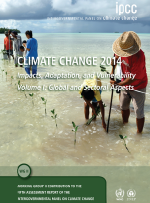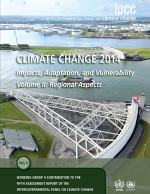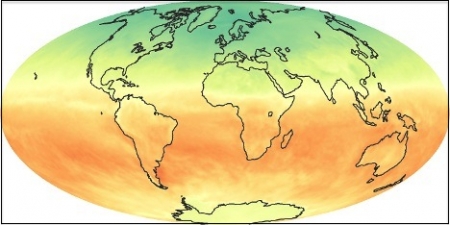The latest Intergovernmental Panel on Climate Change (IPCC) report, this one from Working Group II, just hit the streets. You can read about it in many major news outlets. Headlines are emphasizing the sharp tone of this report and the projected and existing impacts on health and food supply.
This report considers the vulnerability and exposure of human and natural systems, the observed impacts and future risks of climate change, and the potential for and limits to adaptation. The chapters of the report assess risks and opportunities for societies, economies, and ecosystems around the world. There are 30 chapters in this report, divided into two volumes.
Volume I: Global and Sectoral Aspects (including such topics as Food security, Human Health, and Economics of Adaptation)
Volume II: Regional Aspects (including North America and the Poles)


The print version will not be issued for a few months but you can access all of this info on line now. Main website for the report: http://www.ipcc.ch/report/ar5/wg2/
Selected Links
Examples of FAQs and excerpts of answers:
FAQ 3.4: Does climate change imply only bad news about water resources?
There is good news as well as bad about water resources, but the good news is very often ambiguous. Water may become less scarce in regions that get more precipitation, but more precipitation will probably also increase flood risk; it may also raise the groundwater table, which could lead to damage to buildings and other infrastructure or to reduced agricultural productivity due to wet soils or soil salinization.
FAQ 4.2: What are the non-greenhouse gas effects of rising carbon dioxide on ecosystems?
Higher CO2 concentrations enhance photosynthesis and growth (up to a point), and reduce the water used by the plant. High CO2 levels cause the nitrogen content of forest vegetation to decline and can increase their chemical defences, reducing their quality as a source of food for plant-eating animals. Furthermore, rising CO2 causes ocean waters to become acidic (see FAQ 6.3), and can stimulate more intense algal blooms in lakes and reservoirs.
FAQ 4.5: Why does it matter if ecosystems are altered by climate change?
Ecosystems provide essential services for all life; food, life-supporting atmospheric conditions, drinkable water, as well as raw materials for basic human needs like clothing and housing. Ecosystems play a critical role in limiting the spread of human and non-human diseases.
FAQ 6.1: Why are climate impacts on oceans and their ecosystems so important?
Oceans create half the oxygen (O2) we use to breathe and burn fossil fuels. Oceans provide on average 20% of the animal protein consumed by more than 1.5 billion people.
The IPCC on the Hope for the Future
"Prospects for climate-resilient pathways for sustainable development are related fundamentally to what the world accomplishes with climate-change mitigation (high confidence).
"Since mitigation reduces the rate as well as the magnitude of warming, it also increases the time available for adaptation to a particular level of climate change, potentially by several decades. Delaying mitigation actions may reduce options for climate-resilient pathways in the future.
"Transformations in economic, social, technological, and political decisions and actions can enable climate-resilient pathways (high confidence).
"Specific examples are presented in Table SPM.1. Strategies and actions can be pursued now that will move towards climate-resilient pathways for sustainable development, while at the same time helping to improve livelihoods, social and economic well-being, and responsible environmental management."
About the Fifth Assessment:
The IPCC’s Fifth Assessment Report (AR5) contains contributions from three Working Groups. Working Group I assesses the physical science basis of climate change. Working Group II assesses impacts, adaptation, and vulnerability, while Working Group III assesses the mitigation of climate change. The Synthesis Report draws on the assessments made by all three Working Groups. The first two Working Group Reports are now available. WG I report is in print form, WG II online only as of March 31, 2014. TheWG III report is due out in early Fall of 2014.

